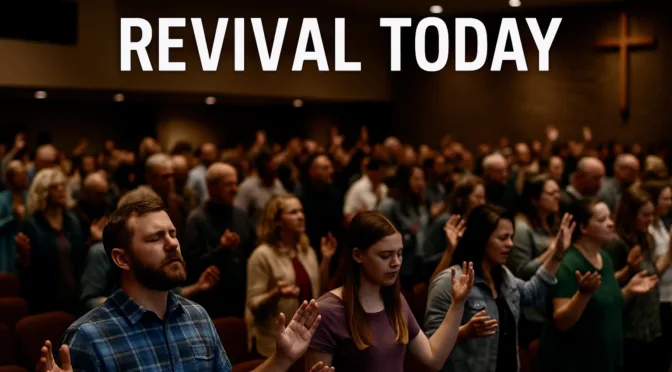When God moves, He does not simply fill a room—He shakes the very foundations of hearts and nations. Revival is never about bigger crowds, more services, or even temporary excitement. It is about the manifest presence of God descending upon His people with power, holiness, and undeniable glory. As we reflect on previous moves of God, they instruct us not only in recognizing true revival but in preparing ourselves for it.
During the First Great Awakening, it was not eloquent sermons but the heavy conviction of sin that swept across entire towns. The Azusa Street Revival was not built on slick programs but on humble prayer, with miracles, healings, and the outpouring of the Holy Spirit marking the days. In the Welsh Revival, society itself bowed—crime plummeted, taverns closed, and homes became houses of prayer. Revival, historically, has never been about filling seats; it has been about emptying hearts before God.
Today, some churches rejoice in growth—three services, full pews, and five or six salvations a month. And indeed, heaven rejoices over one sinner who repents (Luke 15:10, NASB). Yet, revival is not simply more activity or bigger buildings. True revival is when the very atmosphere becomes saturated with God’s holiness. It is not measured by numbers but by transformation—radical, visible, undeniable change.
And there is a deeper problem in the body today: walls. Many churches have built up barriers against fellow believers over “doctrinal errors,” disagreements, and prideful divisions. Instead of the body being one, it has been fractured into camps. But in a true revival, God would tear down those walls.
“For He Himself is our peace, who made both groups into one and broke down the barrier of the dividing wall.” (Ephesians 2:14, NASB)
Revival will demolish the pride that fuels division. It will make theological arguments melt before the overwhelming presence of God. It will cause us to weep not only for the lost but for the way we have treated one another. Doctrinal purity matters, but love for the brethren is the mark of true discipleship (John 13:35, NASB). In revival, the walls man built will crumble under the hand of the Almighty, and the Church will be called back to unity in Christ—not uniformity of opinion, but unity of Spirit.
What would revival look like today?
It would break out of our carefully crafted schedules. It would overtake ordinary days with extraordinary encounters. Miracles would once again be signs that point to the living God, not spectacles for entertainment. Broken bodies, broken hearts, and broken homes would be healed.
It would not be confined to one church. True revival would leap from city to city, home to home, heart to heart—uncontainable and unstoppable.
It would not simply save souls but disciple nations. It would not just gather crowds but gather worshipers who worship in spirit and truth.
And it would be fueled by repentance—deep, raw, tear-streaked repentance. Not only for our sins but for our divisions. For our pride. For the walls we built where God called us to be one.
Revival today would be holy chaos: sinners saved, saints sanctified, the proud humbled, and the walls between believers torn down by the hand of God Himself.
No man could orchestrate it. No program could schedule it. No wall could withstand it.
Only God could do it—and only hungry hearts will see it.
But before we cry out for revival in our nation, we must ask: are our own houses ready to host His presence?
Self-Reflection for Houses of God: Preparing the Congregation for Revival
Before revival sweeps through cities, it must first sweep through the house of God—the local congregation. We often long to see the fire fall, but have we prepared the altar where it might rest? Revival does not begin in the crowds; it begins in the hearts of the leaders, the worshipers, and the intercessors within the house.
“For it is time for judgment to begin with the household of God.” (1 Peter 4:17, NASB)
If we truly desire revival today, we must first examine our house:
- Is Jesus exalted above all programs and personalities?
- Is the Word of God honored without compromise?
- Is prayer the engine of the congregation, or an afterthought?
- Are we walking in unity, or are divisions and offenses quietly tolerated?
- Are miracles welcomed or explained away?
- Is holiness pursued, or is it considered optional?
Far too often, churches today are busy building walls—walls of doctrinal division, walls of competition, walls of pride. We must repent. In true revival, God will tear down every wallwe have built to separate ourselves from the larger body of Christ. If we cling to factions, if we protect our image more than His presence, revival will bypass us.
Revival will come to the house that is hungry for God, not for applause. It will fall where the Spirit is not grieved but welcomed. It will rest where repentance is real, prayer is fervent, and Jesus alone is glorified.
How can we apply this to our house of God?
- Call the congregation to fasting and prayer.
- Tear down unspoken offenses and seek reconciliation.
- Re-center the ministry on the Word and the Spirit.
- Remove anything that quenches the move of God—whether pride, control, or tradition.
- Teach and model humility, holiness, and hunger.
- Be willing to lose the crowds if it means gaining His presence.
Revival today will not look like bigger budgets and flashier lights. It will look like a humble congregation on their knees, weeping for more of God, welcoming His Spirit, and abandoning everything else for the sake of His glory.
If we prepare the house, He will come.
“Prepare the way of the Lord, make His paths straight!” (Mark 1:3, NASB)














